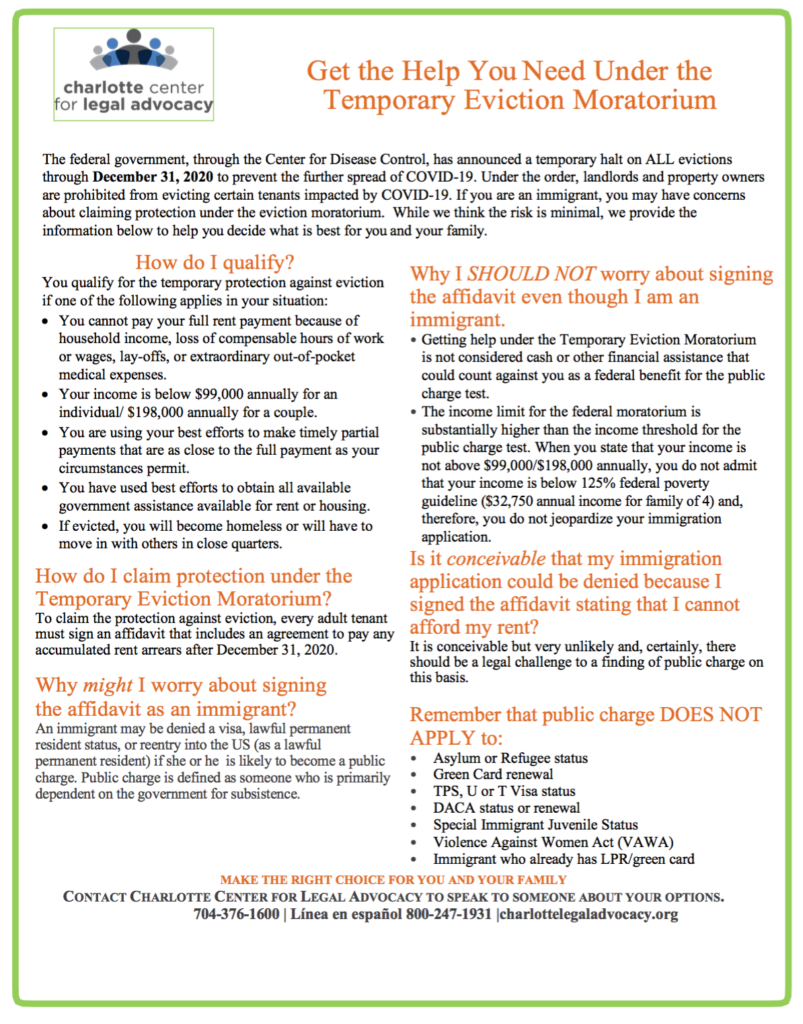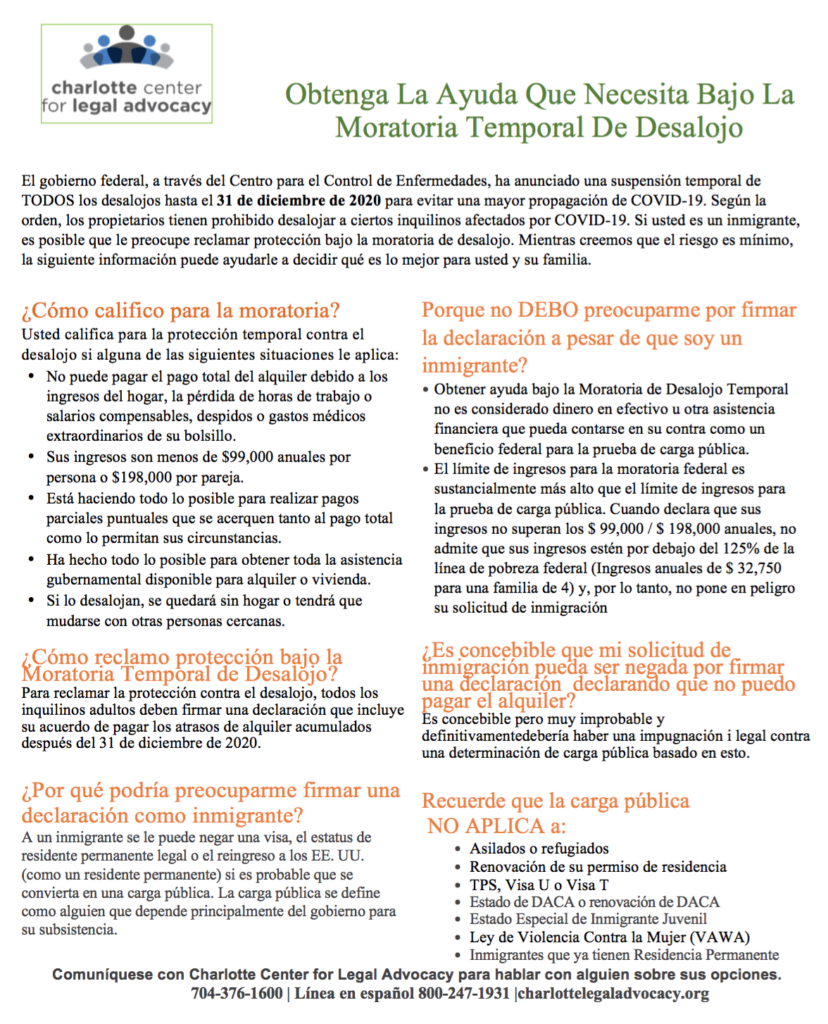*Updated June 29, 2021. Original post September 10th, 2020*
The federal government, through the Center for Disease Control, has announced a temporary halt on evictions through July 31, 2021 to prevent the further spread of COVID-19. Under the order, landlords and property owners are prohibited from evicting certain tenants impacted by COVID-19. If you are an immigrant, you may have concerns about claiming protection under the eviction moratorium. While we think the risk is minimal, we provide the information below to help you decide what is best for you and your family.


How do I Qualify?
You qualify for the temporary protection against eviction if one of the following applies in your situation:
- You cannot pay your full rent payment because of household income, loss of compensable hours of work or wages, lay-offs, or extraordinary out-of-pocket medical expenses.
- Your income is below $99,000 annually for an individual/ $198,000 annually for a couple.
- You are using your best efforts to make timely partial payments that are as close to the full payment as your circumstances permit.
- You have used best efforts to obtain all available government assistance available for rent or housing.
- If evicted, you will become homeless or will have to move in with others in close quarters.
How do I claim protection under the Temporary Eviction Moratorium?
To claim the protection against eviction, every adult tenant must sign an affidavit that includes an agreement to pay any accumulated rent arrears after July 31, 2020.
- Sign this declaration if the tenant meets its requirements.
- The declaration is a sworn statement, and there are criminal penalties for signing the declaration if it is not true!
- Give the signed declaration to the landlord
- Keep copies of the signed declaration.
- Follow the rental agreement.
Why might I worry about signing the affidavit as an immigrant?
An immigrant may be denied a visa, lawful permanent resident status, or reentry into the US (as a lawful permanent resident) if she or he is likely to become a public charge. Public charge is defined as someone who is primarily dependent on the government for subsistence.
Why I SHOULD NOT worry about signing the affidavit even though I am an immigrant:
- Getting help under the Temporary Eviction Moratorium is not considered cash or other financial assistance that could count against you as a federal benefit for the public charge test.
- The income limit for the federal moratorium is substantially higher than the income threshold for the public charge test. When you state that your income is not above $99,000/$198,000 annually, you do not admit that your income is below 125% federal poverty guideline ($32,750 annual income for family of 4) and, therefore, you do not jeopardize your immigration application.
Is it conceivable that my immigration application could be denied because I signed the affidavit stating that I cannot afford my rent?
It is conceivable but very unlikely and, certainly, there should be a legal challenge to a finding of public charge on this basis.
Remember that public charge DOES NOT APPLY to:
- Asylum or Refugee status
- Green Card renewal
- TPS, U or T Visa status
- DACA status or renewal
- Special Immigrant Juvenile Status
- Violence Against Women Act (VAWA)
- Immigrants who already have LPR/ a green card
CONTACT CHARLOTTE CENTER FOR LEGAL ADVOCACY TO SPEAK TO SOMEONE ABOUT YOUR OPTIONS.
- 704-376-1600
- Línea en español 800-247-1931
Obtenga La Ayuda Que Necesita Bajo La Moratoria Temporal De Desalojo
El gobierno federal, a través del Centro para el Control de Enfermedades, ha anunciado una suspensión temporal de TODOS los desalojos hasta el 31 de julio de 2021 para evitar una mayor propagación de COVID-19. Según la orden, los propietarios tienen prohibido desalojar a ciertos inquilinos afectados por COVID-19. Si usted es un inmigrante, es posible que le preocupe reclamar protección bajo la moratoria de desalojo. Mientras creemos que el riesgo es mínimo, la siguiente información puede ayudarle a decidir qué es lo mejor para usted y su familia.
¿Cómo califico para la moratoria?
Usted califica para la protección temporal contra el desalojo si alguna de las siguientes situaciones le aplica:
- No puede pagar el pago total del alquiler debido a los ingresos del hogar, la pérdida de horas de trabajo o salarios compensables, despidos o gastos médicos extraordinarios de su bolsillo.
- Sus ingresos son menos de $99,000 anuales por persona o $198,000 por pareja.
- Está haciendo todo lo posible para realizar pagos parciales puntuales que se acerquen tanto al pago total como lo permitan sus circunstancias.
- Ha hecho todo lo posible para obtener toda la asistencia gubernamental disponible para alquiler o vivienda.
- Si lo desalojan, se quedará sin hogar o tendrá que mudarse con otras personas cercanas.
¿Cómo reclamo protección bajo la Moratoria Temporal de Desalojo?
Para reclamar la protección contra el desalojo, todos los inquilinos adultos deben firmar una declaración que incluye su acuerdo de pagar los atrasos de alquiler acumulados después del 31 de julio de 2020.
¿Por qué podría preocuparme firmar una declaración como inmigrante?
A un inmigrante se le puede negar una visa, el estatus de residente permanente legal o el reingreso a los EE. UU. (como un residente permanente) si es probable que se convierta en una carga pública. La carga pública se define como alguien que depende principalmente del gobierno para su subsistencia.
Porque no DEBO preocuparme por firmar la declaración a pesar de que soy un inmigrante?
- Obtener ayuda bajo la Moratoria de Desalojo Temporal no es considerado dinero en efectivo u otra asistencia financiera que pueda contarse en su contra como un beneficio federal para la prueba de carga pública.
- El límite de ingresos para la moratoria federal es sustancialmente más alto que el límite de ingresos para la prueba de carga pública. Cuando declara que sus ingresos no superan los $ 99,000 / $ 198,000 anuales, no admite que sus ingresos estén por debajo del 125% de la línea de pobreza federal (Ingresos anuales de $ 32,750 para una familia de 4) y, por lo tanto, no pone en peligro su solicitud de inmigración
¿Es concebible que mi solicitud de inmigración pueda ser negada por firmar una declaración declarando que no puedo pagar el alquiler?
Es concebible pero muy improbable y definitivamentedebería haber una impugnación i legal contra una determinación de carga pública basado en esto.
Recuerde que la carga pública NO APLICA a:
- Asilados o refugiados
- Renovación de su permiso de residencia
- TPS, Visa U o Visa T
- Estado de DACA o renovación de DACA
- Estado Especial de Inmigrante Juvenil
- Ley de Violencia Contra la Mujer (VAWA)
- Inmigrantes que ya tienen Residencia Permanente
Comuníquese con Charlotte Center for Legal Advocacy para hablar con alguien sobre sus opciones.
- Línea en español 800-247-1931
- charlottelegaladvocacy.org